Interviews
American Muslims as a Religious Minority
In Discussion with a Traditional Islamic Scholar and Politician: Abdallah bin Bayyah
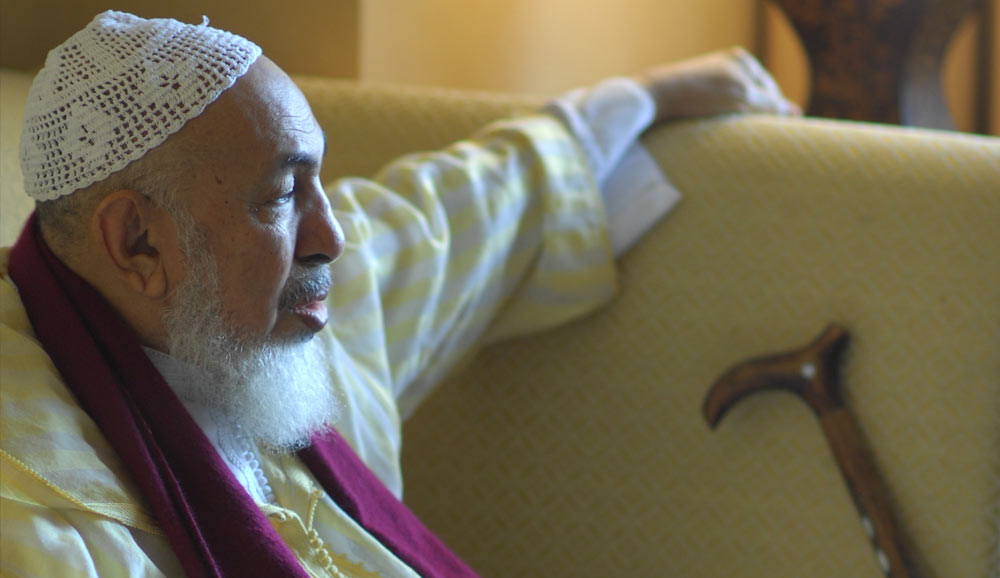
I am intrigued by people who garner not only the attention, but also the respect of many, but in this instance I am somewhat in awe of the tremendous stature one scholar of Islam is accorded by not only lay people, but other scholars from across the Muslim world. For years I have heard of Abdallah bin Bayyah spoken of with great reverence by numerous scholars and leaders of the Muslim community, some of whom may not have as much respect for each other. In speaking with others to prepare for this sit-down interview, the response was unanimous in that we were ‘blessed/lucky/honored’ to have company with the Sheikh. Many of the “rockstar” scholars of Islam that command large audiences around the country refer to him as their teacher, and defer to him with respect and humility. I realize that if we are to understand Islam in America, and determine what kinds of influence the religion plays in the lives of American Muslims, Sheikh bin Bayyah’s voice is a necessary part of the conversation given the respect he has in, arguably, most American Muslim circles.
There are a number of thinkers around the world that have exerted influence on how the public views Islam and the Muslim world, some of whom we interviewed in the past including Samuel Huntington, Bernard Lewis, Karen Armstrong, and others. While Abdallah bin Bayyah may not be as popularly known in western circles, though he does have his share of critics in some right-wing circles, his influence over how Muslims in America understand their religion is beyond a doubt. I approached him for the interview because we, at TIM, understand his influence and believe that if anyone is interested in understanding the Muslim community in America and abroad, particularly in light of the on going discussions related to extremism and violence, then they will benefit from understanding his perspectives on Islam, and in particular American Muslims.
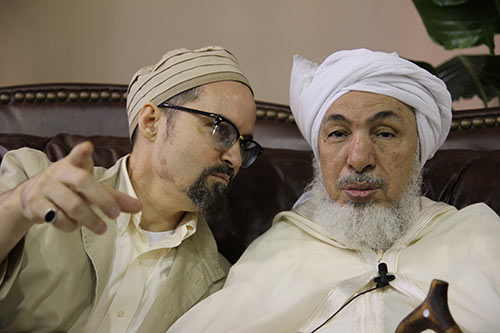
Ali Salar Khawaja
Hamza Yusuf leans in to talk to Abdallah bin Bayyah during a talk he gave at the Adams Center in Northern Virginia in May 2013.The interview has been edited for clarity. It was also translated live by Tarek Elgawhary.
The Islamic Monthly: I’m interested in your insights as a religious scholar and political figure. In America, political groups that speak the language of social justice and addressing the needs of the poor may typically come from the progressive or liberal side of the spectrum. However, if we consider Islam in America, there was a time when the groups within the Muslim community that are for more active in organizing around issues of social justice and humanitarian efforts are also the ones that are more overtly political. This may be in contrast to other more traditional Muslim groups which were focused on individual growth and may have been less organized in the local and international communities in such a way. For example, as a second generation American growing up here in the 1990’s, if I wanted to go to work with Muslims at, say, a soup kitchen, it often was organized by Muslim groups that were more politicized in the understanding of Islam. And if I attended more traditional settings, I found myself more often than not focusing on dhikr [litany], or the inward spiritual sciences. I know we can’t make such broad generalization, but this is an experience that I know was shared by many like me, why do you think such tension had existed between the traditional and political leaning Islamic groups in America and their agendas, if at all, at play?
Abdallah Bin Bayyah: With regards to the relationship of a political Islam and a more traditional-based orthodox normative Islam: Islam as a paradigm focuses on activities of humanity in all its manifestations, so part of it is to focus on self purification scale … and part of it is also on the relationship between one’s own self and things that we believe in, the unseen. And part of it is also based on our relationships with one another. And in this latter part is where there’s this phrase or this concept of the political Islam.
So, Islam believes or advocates this type of a relationship, but not based on the principles of politicians, but based on the principles of the religion itself. And from here, we based our understanding on the personality and the life of the Prophet. So, the ulama [scholars] deduced from his life and his action that the Prophet had three functions. One is his function as a political leader or a body politic. The second was his function as a judge between people. And his third was as a Prophet narrating the message on behalf of God. And all three of these go back to one main principle, which is to spread justice and fairness. “Justice” in Arabic being Al-Adl and “fairness” being this word called Al-Qist. And al qist, according to some, is a non-Arabic word that either comes from Latin or from Persian, and from the concept qist we get “just” in Latin, or “justice,” the concept of justice.
“In society, we are bound by a social contract. And nobody is categorized as going against the social contract, except if they themselves have said that they have left the social contract.”
The Quran speaks of the measuring or the weight so that people will live with fairness. So, we need to have fairness in our society, we need to have fairness also in our homes between husband and wife, and between one’s relatives, and one’s children. And the Prophet spoke to this, and we also have to have justice between one another.
To have this justice, we have to have a balance that we’ve establish this justice and fairness in all our functions of life, in our own personal relationships, in our homes and among our families, with the rest of society and also on an international political level. So, we have to have justice in all of them. If we have justice in all of them, then we will have established the justice that Islam calls for and fairness, and if we are deficient in either of them, then we will have deficiency and we will have imbalance in our fairness and justice.
TIM: If we were to push a little further, could you speak to your understanding of the American landscape in relation to extremist ideologies and how that may tie into issues related to social justice? In other words, if we were to put this in context of — aside from what should be in a theoretical sense — to more of what’s happening now in America, what are your reflections on this tension between these various groups and in this landscape of Islam in America, why would you say these ideologies are emerging and how are they impacting work towards social justice?
Bin Bayyah: So, it’s important — the question is difficult — it’s very important that we have a balance within our own selves in all of the things that I’ve mentioned before and that we don’t feel, in this country, that we are foreigners and that we don’t live with a negative or bad disposition. And regarding how we ourselves act, I’ve noticed that people who have an extremism or sort of extreme tendencies or thinking, they don’t understand the religion, but then they also see some source of tension between themselves and the society at large. They don’t see themselves as part of the society. These are the two things that are happening. But we need a sort of a prescription out of this and sort of a way that we can come out of this, falling into this trap.
So, the first thing I’m focusing on is this verse, where God says to not let the negative disposition or mistreatment of others prevent you from being just to others. It’s very important that we show no racism, that we don’t go against the balance of our own definition of justice in dealing with other people even if other people go against the bounds of justice in treating us, and that when we live in this society, that we have to always make sure that we have justice to ourselves first, and those around us.
“This is something that we pass on to the next generation: that we must have peaceful coexistence in society, and we must have respect for the public order, and we can’t go against this public order. Peace is part of this public order.”
And one cannot help one’s neighbors first without helping oneself first. So, one’s house has to be in order before one is able to help others. And the Muslim in the society is supposed to be a dynamic and productive citizen, not somebody who is just on the sideline. And we need to participate in the society starting with our shared values; we have values that we share with the wider society, so we have to meet the society with those values in addition to helping other people have a better understanding of this balance of justice. So our job is to help raise other people’s actions to be more compliant to having a more balanced justice.
TIM: Again on the issue of progressivism, it has its own definition that may be outside the boundaries of certain Islamic norms and legal realities. Progressives in America will fight for the marginalized, so presently, progressives will support the Muslims not because they believe in Islam but because the Muslims are the marginalized.
The problem is that support comes hand in hand with other issues that some consider problematic, or uncertain how to address, like abortion. So how should Muslims understand this context? How would you advise Muslims who want to understand the way you are talking about traditional Islam — being with the poor and creating jobs and helping those who are marginalized — in the context of dealing with other issues that are not as easy to navigate through, the social and cultural issues that may have clear fault lines in the Shari’a?
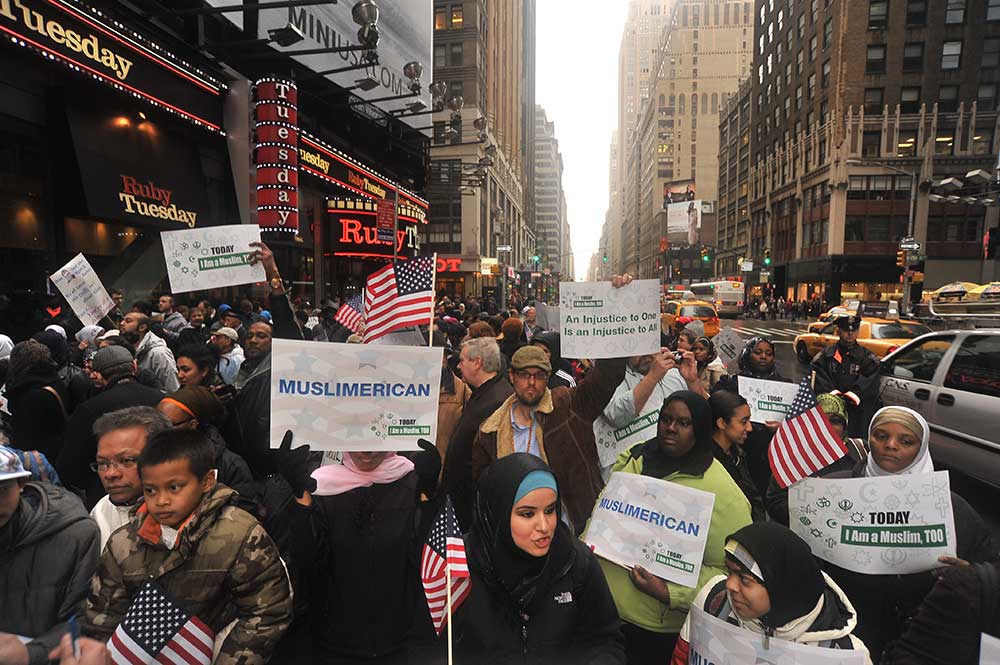
Asterix611/Flickr
Inter-faith protest against Islamophobia and Peter King's congressional hearings on Muslim radicalization 2011 - Times Square, Manhattan NYCBin Bayyah: Society is based on law and institutions. There’s public order, public law institutions and we always have to stay with and begin with the values that we share with society at large, such as justice, equality, freedom, helping the less fortunate and basic human rights. These are all values of Islam, these are all values of society and we have this in common, so we need to build on those shared values. And we should always focus on those values as well as universal values that everybody and every society will accept.
Even in these values, however, there will be differences in how we interpret them, even among people of faith. For example, one of these values is the value of the family but some Muslims in comparison with someone of another faith, might have a different interpretation of the particulars of that value, but nonetheless, we have this basic understanding of family. Anybody understands that we are all different, and we are all different communities and different people. This is a given and we start here. We also have to understand that in society, we are bound by a social contract. And nobody is categorized as going against the social contract, except if they themselves have said that they have left the social contract. If somebody says I’m part of the society or I’m part of this group, we accept them in this group without searching what they believe, without trying to investigate and spying on what they believe on this and that, but only by one’s own declaration can [one] leave the social contract. And we accept people into the social contract even knowing that we share a certain value, in this case the family, but we might have a different interpretation of what this value is. We have a balance between these shared values with the society as well as our own particular understanding as our identity as Muslims.
There’s a general understanding in the general social contract or in the general value of the society, and there are particular beliefs or understanding as Muslims and our definition of what that is, and we raise our children on this particular identity, on this particular values, the values of Islam. And part of the particular value of us as Muslims, is we believe in peace and cohesion in society, even among people of different faiths. Take for example, in Egypt we were at a conference that was attended by Sheikh of Al-Azhar [University in Cairo] and the director of the Bibliotheca Alexandria. Part of our particular beliefs as Muslim is that we uphold peace and cohesion in society as a principle of Shari’a. Our belief is firm in this and this is something that we pass on to the next generation: that we must have peaceful coexistence in society, and we must have respect for the public order, and we can’t go against this public order. Peace is part of this public order.
TIM: Scholarship requires patronage, but patronage often influences scholarship. How can Islamic scholarship free itself of the institutional constraints of this patronage? How do we arrive at a kind of scholarship that is fearless with respect to powerful people or groups that attempt to influence scholarship to serve their own needs? Take the Arab Spring, for example, where you might have scholars who may have been less critical out of their own concerns for the results of that criticism?
Bin Bayyah: The ulama today from different places and different countries are all influenced by their surroundings and particular political circumstances. At the same time, we shouldn’t accuse all of the ulama who are in the political circle that they are bad or that they are influenced. We can’t make this a wide statement that encompasses all the ulama. At the same time, we can’t deny that there is this type of impact.
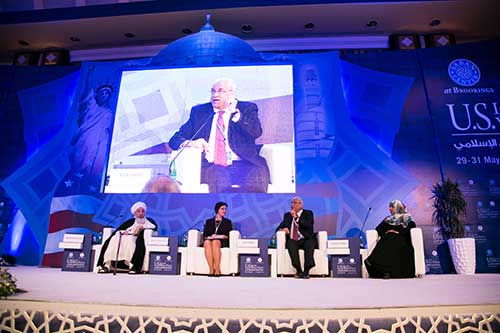
Likewise — and this happened after the Arabs Spring more than any era — any ruler or any political party can’t say that “we represent Islam,” because that ends up forcing the ulama to come on board and say, “yes, this represents Islam.” What ends up happening is if you say that, then that means the other [side] is outside of Islam. This is a very, very dangerous circumstance and this has happened unfortunately after the Arab Spring, in which particular rulers or particular political parties will say that “we represent Islam,” and this leads to others being cast out, rather, they should say “this is our opinion,” or “this is our position” or “our interpretation.”
TIM: In America, many emphasize expressing Islam within the fabric of American society — we are Muslim and American, and that is not a mutually exclusive identity. At the same time, this perspective often limits the community’s ability to be critical of what America does, which can be destructive or immoral. As a result, it is possible that the language of the community pushes certain youth into the hands of more violent interpretations of Islam that speak directly (albeit violently) to these immoral or destructive acts. How do we balance our identities as Muslim Americans with the reality that we must articulate a moral response to American excess, lest the extremists fill that vacuum?
So, for example, think of the Tsarnaev brothers. In the instance when a youth reacts to policies of America, they may find that there is no space in which they could express their feelings of displeasure, out of fear that they would be labeled anti-American or not American enough, even within the Muslim community. The result would be that they would not find a voice from the community that addresses their concerns in a meaningful way. So they may naturally gravitate toward extremists who are able to articulate a critique of certain American actions in a way that is attractive to youth, and in which the youth may understand to be true. These youth are looking for an outlet for their frustration, and when they don’t find it, may ultimately abandon the concept of being an American Muslim in exchange for something more malevolent. I would go so far as to say that the fear of being perceived as un-American limits the extent to which that criticism can take place within our community. As an observer of the rhetoric of the community pre- and post-9/11, I’m curious, how do you counsel American Muslim scholars to balance these issues? Do you think that if the mainstream community expresses criticism in a nonviolent way, this would help reduce the pull of extremism for certain youth that may otherwise be inclined to it?
“We have to balance our particular identity as Muslims and our general identity as being parts of this greater society, and we don’t go against either identity.”
Bin Bayyah: This is a really confusing issue and I’ve talked about it in the past with others. The basic answer, the short answer, is that we need to have education because you can’t answer this question specifically and straightforward as it applies to everybody because it has to deal with individuals. It’s very difficult to provide a full-proof answer. However, in general, the basic solution to this is that we have to balance our particular identity as Muslims and our general identity as being parts of this greater society, and we don’t go against either identity.
And, we have to protect and preserve our particular identity as Muslims without harming others based on the Prophetic teachings in which he said there is no harm and there is no reciprocating harm, La Darar Wa La Dirar. And this is a religious injunction. This is something we’re obliged to do. We can’t harm others in doing this. And he says, at the same time, we might have a civic obligation and a civic injunction to criticize what is happening because this is part of what we’re supposed to do as citizens. And he says, many times the civic injunction is a religious injunction, and the religious injunction is a civic injunction, like in this case. So, these are things that we should do because we have these both identities, particularly as Muslims, and generally as citizen of this country.
“It is very important also that we need to not emphasize our particular identity over the general identity that we have as Americans; rather, as we’ve said before, to build on our shared values, because every time we build on something that we share with the general society, we build a lasting peace and a lasting sort of stronger civic involvement between all of us.”
It is very important also that we need to not emphasize our particular identity over the general identity that we have as Americans; rather, as we’ve said before, to build on our shared values, because every time we build on something that we share with the general society, we build a lasting peace and a lasting sort of stronger civic involvement between all of us. Every time we focus more on preserving our particular identity than the general identity, then that’s where we have a tension. Some people, they will think that their particular identity disallows them to deal with others, and this is why we have the danger of extremist thinking, and this extremist thinking and extreme action always leads to danger. And this is absolutely haram [unlawful], it’s not permitted in Islam that we emphasize one over the other.
For example, people who have a negative or sort of extreme disposition, they will say “don’t participate in elections.” We say “participate in elections.” This happened in Hungary, the Muslims boycotted the elections and … the far right won. Rather what we should do is we should, as minorities, we should participate in the elections and we should elect who we think is best for our society whether they’re Muslim or non-Muslim.
Another example is some people who have this sort of extreme disposition say don’t visit non-Muslims when they’re sick, don’t congratulate them on their holidays or when something happens to them, don’t send your condolences when they pass away. But rather, we say, based on our predicament as minorities, we should do all of these things. So, what we need to do is — our job is as ulama, as scholars — is we need to teach Muslims how to do these things based on the principles of Islam, not based on what’s modern or what’s in style or in vogue, but rather we have to deduce from our sources, from our principles — our Islamic principles — these type of actions and increase our Islamicity or increase our Islamic practice through doing these things.
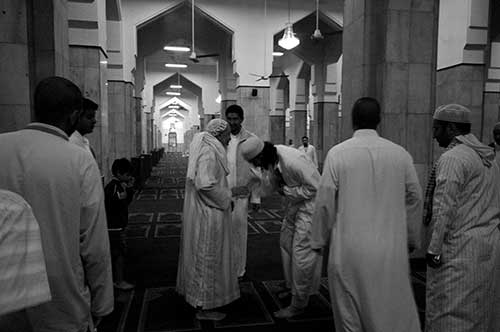
Dr Javed Khan/Flickr
TIM: I wish to address the thought that many state about you that you are one of the rare scholars of Islam that is respected by the wide spectrum of Muslim thoughts. How is that achievable in a global context where sectarianism is so vast and it appears that it’s a zero-sum game?
Bin Bayyah: This is a very difficult situation particularly now. And there’s a very raging battle between Sunnis and Shias, and unfortunately, I don’t see when this is going to end, and I have a feeling that it might not end any time soon. It’s very important that we keep Muslims in the West as far away from the particulars of this conflict as much as possible and what results from this war, and we should continue to build on things that we are in agreement with the wider society and not focus on the things that divide us. And this also applies to Sunnis and Shias. We should try to work with Shias who are living in this type of society with us, on the same basis, on working on the things that we agree with and avoiding the things that we don’t agree with. I understand that this is idealistic and maybe not very realistic but we should try to do this nonetheless and reduce the impact as much as possible that this war and conflict will have on the Muslims living in the West. I can imagine as well that the wise people, the ulama from the Muslims in the West, could have an impact on Muslim-majority societies in trying to alleviate this tension. I unfortunately don’t think [this tension] will end any time soon.
This doesn’t mean that we should have an opinion on this type of conflict, but we shouldn’t build this opinion on the principles of a certain group or another group. Rather, we should build this opinion on wider principles such as human rights and justice. So, for example, the genocide that’s happening in Syria, we can call it a “genocide” and we can say that this is injustice, that this is against human rights, but we’re not making an argument for one group versus another. And this type of approach is something that will be more accepted and will lead us into less trouble — that we don’t build an opinion on a particular group or a particular madhab or a particular side of the conflict, but rather from the general point of view of human rights and, again, the values that are shared and understood.
We’re against injustice whether it’s against a Sunni or a Shia.
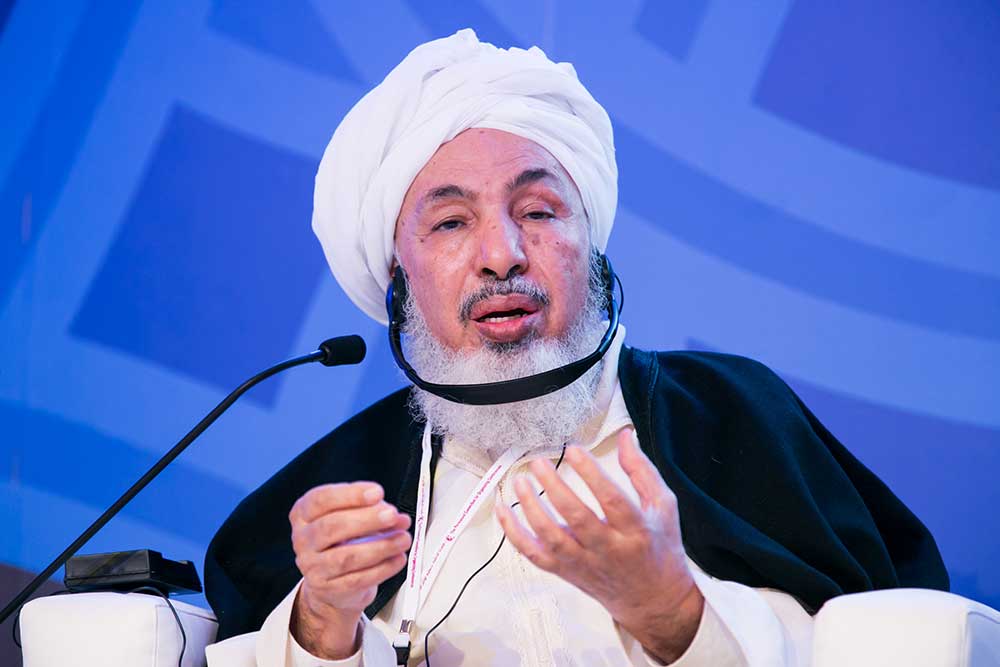
Dr Javed Khan/Flickr
TIM: I’d like to get a sense of how you see the scholarly landscape in America. There are a number of scholars with large followings as well as emerging ones. What do you make of their leadership strategies and the ways in which they are influencing the community or should be influencing the community?
Bin Bayyah: Ulama and scholars in America are a new experience and it’s fairly young and in its infancy. So, for example, in Europe, particularly in the U.K. and in Ireland, we established different councils of the ulama. A lot of this is young or a lot of the ulama in the West, they came to the eastern — to the Muslim world — to study and then they came back. And the main challenge, as I see it, is how do you live a life, not just in the West, but also in the modern age? So, it’s really about the modern age, not just a particular country, based on the principles of Islam, and this is the big challenge. So, I advise the ulama whom I’m in touch with to be very firm in the understanding of Islamic law, very firm in the understanding of the principles of Islamic law, the Maqasid [the objectives of faith], and also to be equally knowledgeable about our current situation and our current predicament. We live in an age in which these changes are seismic. And it’s not a very sort of minor thing, and the real challenge is how do we find an Islam, based on Islamic principle, that can manifest itself within these changes, that’s compatible with both. One thing that we really need is we have to have a very serious approach to education and we have to have solid education that links us to the greater society.
TIM: What is one thing people would be surprised to know about you?
Bin Bayyah: I’m a human being.